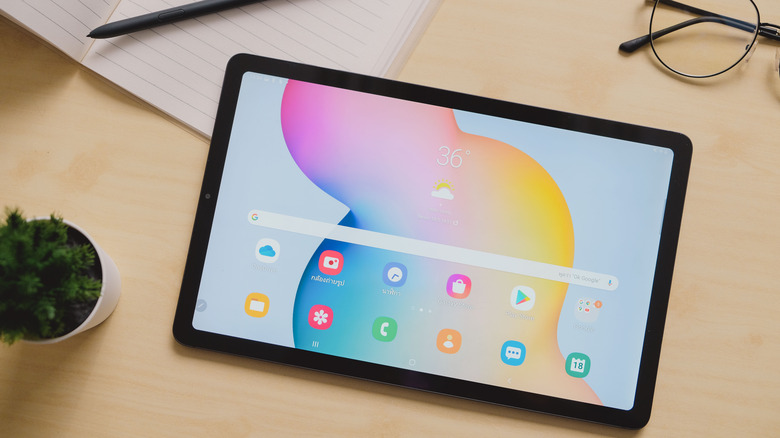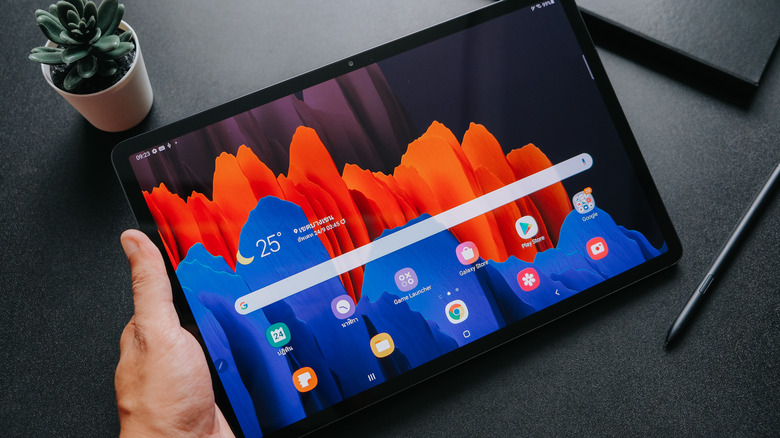Pixel Tablet Is A No-Go - Why Google Doesn't Make Android Slates
Google never had a great relationship with tablets. It wasn't until the disaster that was Android 3.0 Honeycomb did the mobile platform acknowledged the tablets that had long existed before it, and even then, it took a few iterations for Android to stop feeling awkward on large screens. Google itself would only make two and a half tablets under the Nexus brand, a forgettable Pixel C, and the only Pixel Slate in existence that ran Chrome OS instead. There is now some speculation that Google might be ready to take another whack at it, but a Google Android tablet might actually make little sense for the company because it doesn't mesh well with its ultimate goal.
Patented Idea
Conjecture about a Google-branded tablet has been around for years, but the recent spate of rumors may have grown out of two things. First is a 2019 patent that just got approved in Japan that has been given a concept design treatment by LetsGoDigital and graphic designer Giuseppe Spinelli, aka Snoreyn. As we all (should) know by now, patents don't exactly turn into products. At the very least, it just calls dibs on whatever idea or design Google might have for such a product in the future.
The other "inspiration" for these rumors is the launch of the iPad mini 6 and, to some extent, the success of the iPad Pro line. That has naturally been a source of much discussion over what Google will have to rival Apple's tablet dominance, but these tablets might not mean much to Google anyway. Although it does give Apple the upper hand in a specific market segment, it's not a device form factor that Google believes will actually push its goals forward.
Un-Android Experience
Google never liked tablets because they skewed the nice user experience it has been trying to push for in the early days of Android. It didn't help that Samsung and other OEMs wildly differed in their implementations of Android for tablets, forcing Google to finally set some standards for Android on a large screen. Even today, however, the state of Android apps running on tablets is far worse than what iOS apps have been criticized for, and the market dynamics for years hasn't given developers much motivation to design their apps around tablets as well.
Tablets did more than require a different UI layout, however. They also presumed different use cases, interaction methods, and functionality. Things that would have been cumbersome on smartphones actually make great sense on tablets, like dragging and dropping content, precision input with a stylus, and displaying multiple apps or windows simultaneously. It challenged most of the fundamental aspects of Android's UX in ways that Google might not have really bothered to think about. Although a leader in tablets, it wasn't until the first iPad Pro in 2015 that Apple started to refine iOS for tablets until it spun off into its own iPadOS.
Chromebook Competition
Since Google has long been called out for imitating Apple, it isn't surprising that there have been expectations that it would sooner or later launch a Pixel-branded tablet. Even before this new-ish patent landed on the news, rumors and signs of a Pixel Fold hinted at a hybrid between phone and tablet. It's still debatable whether that would actually appear soon, but it won't be the iPad competitor that Google wants or needs anyway.
Part of the success of the iPads, both Pro and non-Pro models, isn't just for their larger screens. Some might even argue that the biggest use cases for these Apple slates have always been in education and lately in content production. Google already has something in those markets, both under its name and under other OEM brands, and they don't run Android. Chromebooks, especially the convertible or 2-in-1 types, have a better chance of displacing the iPad in those key markets, while larger Android phones continue to make tablets less practical in most cases.
Tablets in a Google World
Each of Google's hardware products is designed to make its services more accessible in any circumstance. Android phones make Google mobile, Chromebooks put the Web at your fingertips, Nest gives Google a home, Android Automotive is your smartphone on wheels, and Chromecast puts all of those in your face. In that ecosystem, a tablet has little to no room to be needed.
A large portable screen might be one excuse, but gigantic phones in the Android world make it inconvenient to bring another device with you everywhere. At home, that large screen is your Android or Google TV, or a smart display that may or may not have a detachable tablet part can also play the part. And when it comes to getting work done, the variety of Chromebooks lets you choose your mobile partner rather than being stuck with what Apple has available. There really is no reason for tablets to exist, at least as far as Google itself is concerned.
Wrap-up
That's not to say a Pixel Fold or Pixel Tablet won't happen since Google isn't really shy to do expensive experiments that get abandoned after consumers invest heavily in them. It also doesn't mean that Google doesn't care about Android since it does want the platform to be supported in a wide range of devices. More importantly, it also wants to be able to control the quality of Android on tablets, so it's doing its best to provide the framework and features that manufacturers will need rather than have them go off on their own again.
In the grand scheme of things, however, a Google-branded Android tablet might not be at the top of its list. Not when it can still milk the Pixel phone and Pixel Chromebook for as long as it can. Fortunately, other companies aren't limited to Google's end goal and are more than happy to flood the market with Android tablets that bring in the dough, no matter how small it may be.

